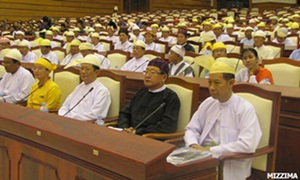Burma’s National Human Rights Council was formed illegally and funding for the body was removed from the current fiscal budget in the final days of the parliamentary session, which ended on Sunday.

The Parliament refused to approve the government’s budget proposal to fund the human rights body on the grounds that its formation did not conform to the Constitution, according to an article in the Myanmar Times on Monday. It is unclear how the body will be funded prior to the next session of Parliament in late April.
The government had requested a budget of 547,208 million kyat for the Human Rights Commission – formed by order of President Thein Sein on September 5 – for the 2012-13 fiscal year, in addition to 139.86 million kyat for capital expenditure on office equipment, furniture and vehicles, the newspaper reported.
Speaker Khin Aung Myint forwarded the request – made as part of the 2012-13 National Planning Bill – to the Joint Bill Committee after Lower House representative Nan Wah Nu of Konhein raised doubts about the commission’s eligibility for funding.
Nan Wah Nu challenged the way the commission was formed on March 15.
On March 16, the speaker said, based on the bill committee’s report, that the requested budget could not be approved because the commission had not been formed with the Parliament’s approval and its policies and objectives had not been included in the national planning bill.
He told lawmakers, “I hereby submit that the formation of the Myanmar National Human Rights Commission was not in conformity with the Constitution and existing laws. It is found that the Myanmar National Human Rights Commission also accepts this point in its submission.”
“Therefore I, as the speaker of Pyidaungsu Hluttaw [Parliament], have decided to nullify the inclusion of the Myanmar National Human Rights Commission in the list of central bodies of the state and its allotment in the budget.”
Earlier, Nan Wah Nu had argued that the president, when he formed the commission, had not sought parliamentary approval as is required under the Constitution.
She said that the president had ordered that the “Human Rights Commission’s chairman is given privileges and insignia of a minister and its members are entitled to what a deputy minister is given.”
But, she noted that “Section 202 of the Constitution … states that the president with approval from the Pyidaungsu Hluttaw [Parliament] may designate ministries or number of ministers, may amend, add or deduct [ministries or number of ministers], and may appoint ministers.
“The Myanmar National Human Rights Commission can only be included as a union-level body or central body after it is approved by the hluttaw [Parliament],” she said.
She noted that in many western countries human rights committees and commissions and corruption fighting committees and commissions are overseen by Parliament rather than the government, in order to create greater independence.


